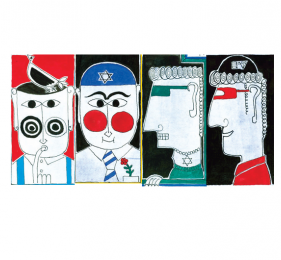Four Types of Jews

This is a modern interpretation of an ancient standard, which is part and parcel of the Seder: the Four Children. By reading and discussing the Four Children, and then responding to it through modern themes, we can come to an understanding of who we are and our relation to the our Children. The source of this section are four verses from the Tanakh which briefly mention children asking, or being told about, the Exodus from Egypt. Using these very general verses, the Rabbis created four prototypes which are given to show us that we must teach a child according to the child's level. At the time the Haggadah was created, it was safe for the rabbis to assume that most Jewish adults had the knowledge available to teach their children about the Exodus. At that time, perhaps, all adults did know about the Exodus from Egypt and the Jews' struggle against Pharaoh. However, in subsequent generations, not all adults are familiar with the story told in the Haggadah, with the people of Israel, with their history. It isn't only the children that need to be taught, but their parents as well. To complicate matters, each Jew is coming from a different orientation with regard to his or her Judaism.
In today's world, Jews may identify themselves in a variety of ways. One may be ritually, culturally, or intellectually orientedor unconnected. And yet, however modified one's Judaism may be, there is still some level of concern about the Jewish people that causes Jews to at least ask the questions about the Exodus from Egypt. If they weren't interested, they wouldn't ask. We must answer them, and enable them to teach their children.
The ritual Jew asks: "What are the laws that God commanded us? " This Jew defines herself by the rituals, the laws and guidelines of Pesach. We call on her to seek the meaning that underlies all of these acts, so that they have relevance for all of us today.
The unconnected Jew asks: "What does this ritual mean to you?" This Jew feels alienated from the Jewish community and finds it difficult to identify with the rituals, perhaps because of his upbringing or experiences. Yet we recognize that he is still interested, if only because he asks these questions, and we call on him to see these rituals as a way of affirming the universal beliefs that gave rise to them.
The cultural Jew asks: "What is this all about?" She shows little concern with the ritual or psychological ramifications of the Exodus, even while embracing this reenactment of our ancestors; flight from Egypt. We call on her to recognize that it was a deep sense of faith that enabled these rituals to transcend the generations. It was belief in a vision of future freedom that caused us to celebrate our first Exodus and hear the echo of the prophets' call: "Let all people go!"
The intellectual Jew refrains from asking direct questions because he doesn't lean in any direction, preferring instead to let the text speak for itself. We call on him to understand that true freedom can only be obtained when we question authority and challenge power, even if that power be God Himself. It is our responsibility to question not only the text but the status quo too, and share this message of freedom with all people everywhere.
Inspired to create
your own Haggadah?
Make your own Haggadah and share with other Seder lovers around the world
Have an idea
for a clip?
People like you bring their creativity to Haggadot.com when they share their ideas in a clip
Support Us
with your donation
Help us build moments of meaning and connection through
home-based Jewish rituals.
OUR TOP CONTRIBUTORS
Passover Guide
Hosting your first Passover Seder? Not sure what food to serve? Curious to
know more about the holiday? Explore our Passover 101 Guide for answers
to all of your questions.






















